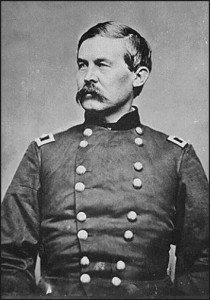Month:
December, 2011
To all of my readers, I wish you a very merry Christmas and a happy, healthy, and prosperous new year. I hope that 2012 is a better year for all of us.
Scridb filter On December 16, 1863, the United States Army lost its best cavalry commander, Maj. Gen. John Buford, who died of typhoid fever in the rented house of his fellow horse soldier, Maj. Gen. George Stoneman, in Washington, D.C. Buford’s dear friend Maj. Gen. John Gibbon once said that “John Buford was the finest cavalryman I ever saw.” He died in the arms of his staff officer and surrogate son, Capt. Myles W. Keogh (who later died with Custer at the Little Big Horn). The Union’s loss was enormous, almost unimaginable.
On December 16, 1863, the United States Army lost its best cavalry commander, Maj. Gen. John Buford, who died of typhoid fever in the rented house of his fellow horse soldier, Maj. Gen. George Stoneman, in Washington, D.C. Buford’s dear friend Maj. Gen. John Gibbon once said that “John Buford was the finest cavalryman I ever saw.” He died in the arms of his staff officer and surrogate son, Capt. Myles W. Keogh (who later died with Custer at the Little Big Horn). The Union’s loss was enormous, almost unimaginable.
Buford was promoted to major general–a long overdue promotion that had long been sought on his behalf–on his deathbed the day he died. In a moment of lucidity, he said, “too late.” And sadly, it was. His final words, as befit the finest cavalryman in the army, were “Put guard on all the roads, and don’t let the men run back to the rear.”
This was the obituary of Buford that ran in the New York Times the next day:
Major-Gen. JOHN BUFORD, who died at Washington yesterday, was a graduate of the West Point Military Academy, and in the Regular army held the rank of Major in the Inspector-General’s Department. He was appointed Brigadier-General of Volunteers on the 27th of July, 1862, and assigned to the command of a cavalry brigade under Gen. POPE, in his Virginia campaign of that year. When that army was merged with the Army of the Potomac, Gen. BUFORD was assigned to the command of the regular cavalry brigade, which he held until the formation of the cavalry corps into three divisions, when he was placed in command of the First division, and served throughout the severe campaigns of the past ten months with the most distinguished gallantry. He was considered the best field cavalry commander in the service, and was noted for his coolness and judgment under fire. He was about forty years of age, of full habit a man of generous nature and warm impulses. Before his death the President rewarded him with the commission of Major-General. The country has lost a noble spirit and a brave defender.
 The great cavalryman was buried in the post cemetery at West Point, where he rests under a handsome monument paid for the by the men of his First Cavalry Division.
The great cavalryman was buried in the post cemetery at West Point, where he rests under a handsome monument paid for the by the men of his First Cavalry Division.
 As some of you may recall, in January of this year, I commenced an experiment. I purchased a black and white Nook with the intention of using it to download public domain regimental histories and the like from Google Books for use in my various projects. A little over a week later, and on the recommendation of Steve Stanley, I exchanged it for a Nook Color. I then began to experiment with it in the hope that I could make it work the way that I hoped to use it. The experiment proved to be terribly frustrating.
As some of you may recall, in January of this year, I commenced an experiment. I purchased a black and white Nook with the intention of using it to download public domain regimental histories and the like from Google Books for use in my various projects. A little over a week later, and on the recommendation of Steve Stanley, I exchanged it for a Nook Color. I then began to experiment with it in the hope that I could make it work the way that I hoped to use it. The experiment proved to be terribly frustrating.
I gave up on the experiment today. No matter what we tried, we were unable to make the thing work with …









 Back to top
Back to top Blogs I like
Blogs I like 